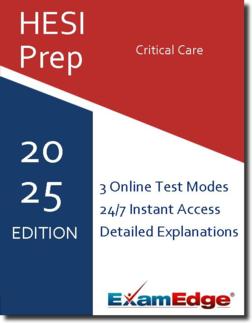HESI Critical Care (HesiCriticalCare) Practice Tests & Test Prep by Exam Edge - Topics
Based on 40 Reviews
- Real Exam Simulation: Timed questions and matching content build comfort for your HESI Critical Care test day.
- Instant, 24/7 Access: Web-based HESI Critical Care practice exams with no software needed.
- Clear Explanations: Step-by-step answers and explanations for your HESI exam to strengthen understanding.
- Boosted Confidence: Reduces anxiety and improves test-taking skills to ace your HESI Critical Care (HesiCriticalCare).



